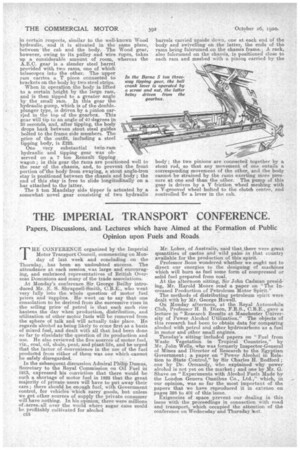THE IMPERIAL TRANSPORT CONFERENCE.
Page 14

If you've noticed an error in this article please click here to report it so we can fix it.
Papers, Discussions, and Lectures which have Aimed at the Formation of Public Opinion upon Fuels and Roads
THE CONFERENCE organized by the Imperial Motor Transport Council, commencing on Monday of last week and concluding on the Thursday, has been an undoubted success. The attendance at each session was large and encouraging, and embraced representatives of British Overseas Dominions and many of the trade associations.
At Monday's conference Sir. George Beilby introduced Mr. E. S. Shrapnell-Smith, C.B.E., who went very fully into the whole questionof motor fuel prices and supplies. Ile, went on to say that one consolation to be derived from the successive rises in the selling price of petrol is that each such rise hastens the day when production, distribution, and utilization of other motor, fuels will be removed from the sphere of talk and will actually take place. He regards alcohol as being likely to come first as a basis of mixed fuel, and dealt with all that had been done so far to elucidate-the question of its production and use. He also reviewed the five sources of motor fuel, viz., coal, oil, shale, peat, and plant life, and he urged that the factor of-convenience in the use of the fuel produced from either of them was one which cannot be safely disregarded.
In the subsequent discussion Admiral Philip Dumas, Secretary to the Royal Commission. on Oil Fuel in 1913, expressed his conviction that there would be such a shortage of motor fuel in 1922 that the great majority of private users will have to put away their cars; there should be enough fuel, with Government control, for vehicles which carry goods, but unless we get other sources of supply the private consumer will have nothing. In his opinion, there were millions of:acres, all over the world where sugar cane could be profitably cultivated for alcohol
c1.8. Mr. Lober, of Australia, said that there were great quantities of cactus and wild palm in that country available for the production of this spirit.
Professor Bone wondered whether, we ought not to direct our energies to the designing of machines which will burn as fuel some form of compressed or solid fuel prepared from coal.
At the afternoon sitting, Sir John Cadman presiding, Mr. Harold Moore read a paper on "The Increased Production of Petroleum Motor Spirit."
The methods of distributing petroleum spirit -were dealt with by Mr. George Howell. .
On Monday afternoon, at the Royal Automobile Club, Professor H. B. Dixon, FEB., C.B.E., gave a lecture in "Research Results at Manchester University of Power Alcohol Utilization." The objects of this research had been to obtain data for comparing alcohol with petrol and other hydrocarbons as a fuel in motor and other small engines.
Tuesday's sitting included papers on "Fuel from Waste Vegetation in Tropical Countries," by Mr. John Wells, who was formerly Inspector-General of Mines and Director of Research to the Egyptian Government ; a paper on "Power Alcohol in Relation to State Control," by Sir Charles H. Bedford ; one by Dr. Orrnandy, who explained why power alcohol is not yet on the market ; and one by Mr. G-. Shave on "Experiments with Alcohol Fuels Made by the London Genera Omnibus Co., Ltd.," which, in our opinion, was so far the most important of the papers that we have reproduced it in extenso on pages 398 to 401 of this issue.
Exigencies of space prevent our dealing in this issue with the proceedings in connection with road and transport, which occupied the attention of the conference on Wednesday:and Thursday lust.




























































